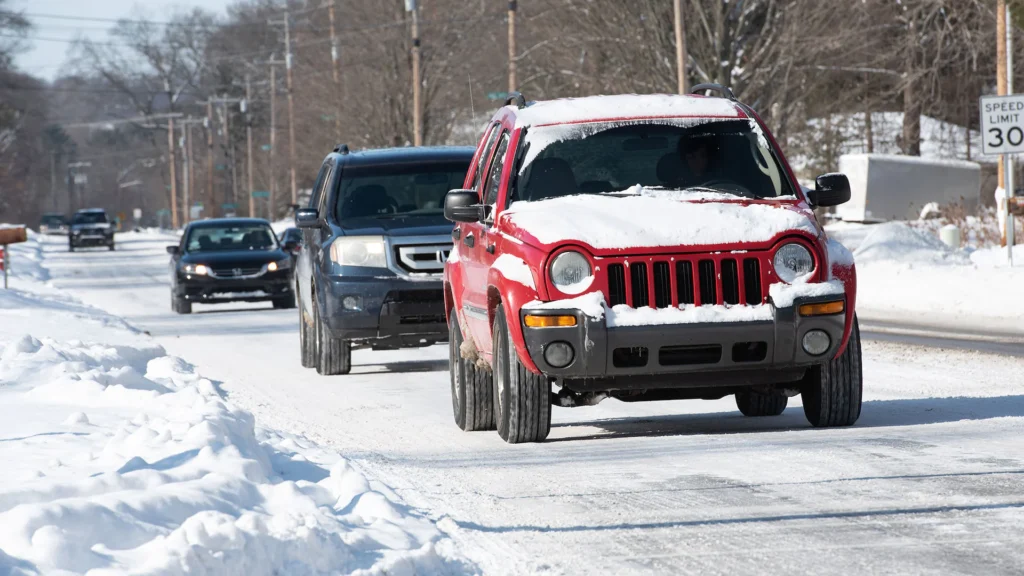As the winter season approaches, Canadians often experience a sense of unease. It’s not just the prospect of enduring long periods of darkness, frigid temperatures, and the daunting task of shoveling snow. Another unwelcome and costly ritual that accompanies the arrival of the cold season is the need to switch tires.
In this blog article, we will delve into the topic Are winter tires worth the money? and provide a comprehensive analysis of whether winter tires are indeed worth the money.
Transitioning to winter tires is a practice dreaded by many Canadians due to the inconvenience and expense it entails. However, it’s essential to understand the reasons behind this requirement and the benefits it brings.
They are specifically designed to provide superior performance and safety in cold weather conditions, including snow, ice, and slush. They offer several advantages over all-season or summer tires, making them worth considering for winter driving.
Are Winter Tires Worth the Money?
Yes, winter tires are definitely worth the money. They offer several critical advantages that make them a valuable investment for anyone living in or experiencing cold and snowy conditions.
Although, the necessity of winter tires depends on several factors, including your location, driving conditions, and personal preferences. While all-season or summer tires can provide satisfactory performance in mild winter conditions, there are compelling reasons why winter tires are considered highly beneficial in colder climates or regions with significant snowfall.
Here’s a closer look at why they are often recommended:
- Improved traction and safety: They are specifically designed to excel in cold weather conditions, including snow, ice, and slush. Their unique rubber compound stays pliable at low temperatures, allowing the tires to maintain a better grip on winter roads. The specialized tread patterns with deeper grooves and biting edges further enhance traction. This improved grip translates into better control, stability, and shorter braking distances, reducing the risk of accidents and improving overall safety.
- Legal requirements: In some regions or countries with severe winters, the use of winter tires may be legally mandated during specific periods or on certain roads. These requirements are in place to ensure the safety of drivers and other road users. Failing to comply with these regulations can result in fines or penalties. Therefore, if you live in an area with such requirements, they become necessary to meet legal obligations.
- Harsh winter conditions: If you reside in an area prone to harsh winter conditions, such as heavy snowfall, icy roads, or prolonged periods of freezing temperatures, winter tires are highly recommended. These conditions can make driving treacherous, and winter tires provide the necessary traction and control to navigate safely. They significantly reduce the risk of skidding, sliding, or getting stuck, ensuring a smoother and safer driving experience.
- Enhanced performance: They not only improve safety but also enhance overall vehicle performance in winter conditions. Their design and construction allow for better handling, responsiveness, and maneuverability. If you value optimal control and confidence while driving, especially in challenging winter weather, using winter tires can provide a noticeable improvement in your vehicle’s performance.
- Peace of mind: Choosing winter tires offers peace of mind during the winter season. Knowing that you have the right tires for the conditions can boost your confidence and reduce anxiety while driving in snow or ice. Winter tires are specifically engineered to tackle winter challenges, giving you added assurance on the road.
It’s important to note that while they offer significant advantages in winter conditions, they are not designed for use in warm or dry conditions. If you rarely encounter harsh winter conditions or live in an area with mild winters, all-season tires may be sufficient for your needs.
However, it’s crucial to evaluate your specific situation, prioritize safety, and consider the potential benefits of using winter tires before making a decision.
When Is The Best Time To Buy A Winter Tire?
The best time to buy winter tires is before the winter season begins, ideally a few weeks or months in advance. Here are a few reasons why:
- Availability: Purchasing them in advance allows you to have a wider selection to choose from. As the winter season approaches, demand for winter tires tends to increase, and popular sizes and models may become harder to find. By buying early, you can ensure that you have access to a range of options and can select the most suitable tires for your vehicle.
- Installation scheduling: Getting your tires installed can take some time, especially if you rely on a service provider or tire shop. By purchasing your winter tires ahead of time, you can book an appointment for installation at your convenience, ensuring that you’re prepared for the winter weather before it arrives.
Related Search: The 5 Best Snow Blowers of 2023
- Cost savings: Some tire retailers offer early bird discounts or promotions for winter tires purchased before the peak season. By taking advantage of these deals, you can potentially save money on your tire purchase.
- Avoiding rush and inconvenience: Waiting until the last minute to buy them can result in unnecessary stress and inconvenience. Long wait times at tire shops, limited availability, and the risk of not finding the right tires for your vehicle can be avoided by planning ahead and making your purchase in advance.
To determine the ideal timing for purchasing winter tires, consider the climate and weather patterns in your region. If you live in an area with early or sudden onset of winter conditions, it’s advisable to buy your winter tires earlier in the season. On the other hand, if winters tend to arrive later or if you don’t anticipate severe winter conditions until a specific time, you can plan your purchase accordingly.
Remember to also factor in the time required for tire installation, alignment, and any additional preparations, such as purchasing tire storage solutions if needed.

People Also Ask
How much are winter tires worth?
The cost of winter tires can vary depending on several factors, including the brand, tire size, and quality. On average, a set of winter tires can range from $100 to $800, check Canadian Tire for more. It’s important to consider that this cost typically includes the price of the tires themselves and does not account for additional expenses such as installation, balancing, and storage fees.
Are they only necessary in areas with heavy snowfall?
Winter tires are beneficial not only in areas with heavy snowfall but also in regions with cold temperatures, icy roads, or slushy conditions. They provide improved traction and handling in a variety of winter weather conditions.
Can I use them year-round?
It is not recommended to use them year-round. They are specifically designed for cold weather conditions and have a different rubber compound that can wear down quickly in warm temperatures. Additionally, their performance and handling characteristics may not be optimal in non-winter conditions.
Do I need to replace all four tires with winter tires?
It is generally recommended to install winter tires on all four wheels of your vehicle. This ensures balanced traction and handling, maximizing the benefits of the tires. Mixing different types of tires (e.g., winter tires on the front and all-season tires on the rear) can lead to unpredictable handling characteristics.
Can I use winter tires on an all-wheel drive (AWD) vehicle?
Yes, the tires are beneficial for AWD vehicles as well. While AWD provides improved traction and stability, it does not substitute for the enhanced grip and braking performance offered by the tires. Combining AWD with winter tires will provide the best possible traction and control in winter conditions.
How long do winter tires last?
The lifespan of the tires depends on various factors such as driving habits, road conditions, and tire quality. On average, winter tires can last for about three to five winter seasons. Regular inspection, maintenance, and proper storage during the offseason can help prolong their lifespan.
Can I use studded winter tires?
Studded winter tires are an option for areas with extremely icy conditions. However, their use may be restricted or regulated in certain regions due to concerns about road damage and noise pollution. It’s important to check local regulations before considering studded winter tires.
Are there any alternatives to winter tires?
While all-season tires provide a compromise between summer and winter performance, they may not offer the same level of traction and control as dedicated winter tires in severe winter conditions. If you live in an area with mild winters or limited snowfall, all-season tires might be sufficient. However, for optimal safety and performance in winter, dedicated winter tires are highly recommended.
Conclusion
Considering the improved traction, enhanced safety, and potential long-term cost savings, winter tires are indeed worth the money for drivers living in regions with harsh winter conditions. Their specialized design and superior performance on icy and snowy roads provide invaluable peace of mind and reduce the risk of accidents. By investing in them, you prioritize your safety and ensure optimal performance during the winter months, making it a smart decision for both you and your vehicle.




